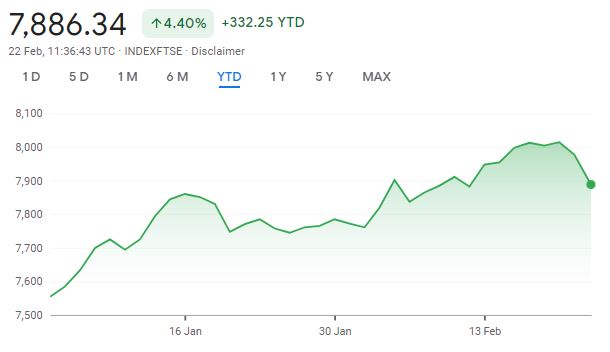The UK has been an unloved region for quite some time, but strong performance from some of the nation’s biggest companies in recent weeks could tempt investors back.
Funds invested in UK equities suffered outflows for 20 months running in January, according to data from Calastone, but the rally in the FTSE 100 index since the start of the year may put the region back on investors’ radar.
It rose above 8,000 for the first time on record last week before dropping back below the milestone, ending Tuesday on 7,978. Even so, the FTSE 100 is up 4.4% from the start of the year, blowing 2022’s annual gain of 0.9% out of the water.
FTSE 100 index in 2023
Source: Google Finance
Ben Russon, co-head of UK equities at Martin Currie, said that the UK certainly offers some appealing value now that growth has fallen out of vogue, but investors “may be reluctant to consider the region at the risk of buying the top”.
Indeed, some wanting to re-enter the UK may think they have missed the boat and be put off by higher prices.
Russon pointed out, however, that the UK’s price to earnings of around 10 is still far cheaper than many other markets such as the US, where the S&P 500 ratio is as high as 17.
The UK market’s future still appears “murky,” according to Russon, as questions around the Bank of England potentially overtightening remain unanswered, but it could be resilient during a global slowdown.
He said: “We think that the UK is well positioned to continue to demonstrate resilience with large exposures to defensive sectors such as pharmaceutical and tobacco, as well as sectors inherently protected against elevated inflation such as oil and gas, and mining.”
These old economy sectors could continue to thrive for quite some time, driving the FTSE 100 up for the first half of the year at the very least, according to James Penny, chief investment officer at TAM Asset Management.
Even if the Bank hits a harder landing than hoped for, Penny pointed out that three quarters of the FTSE 100’s revenues come from overseas, so a tough recession in the UK may not sway the index massively.
He said: “The main sectors of the UK’s large cap index are having their day in the sun compared to the previous decades, when these sectors trailed that of the high flying growth counterparts (predominantly in the US market).”
If value-oriented sectors continue to thrive, the share price of many UK equities are still likely to stay relatively cheap even if they rise, according to James Klempster, deputy-head of the Liontrust Multi-Asset team.
This is because, although valuations have improved and could continue to do so in the coming months, the UK as a whole is still much cheaper than it was prior to the Brexit vote in 2016.
Klempster said: “UK equities remain cheap despite the recent energy bounce and the overall skew to value. The UK outperformed other developed markets last year but there is still a long way to go, particularly if the value rotation continues.”
The affordability of thriving UK stocks may present an appealing buying opportunity, but investors should not be misled by the recent rally in the FTSE 100, according to Louis Tambe, head of managed portfolio service at City Asset Management.
He said that the cheapness of the index means it can make some hefty gains on the upside but can equally drop again if investor sentiment was misplaced.
“The UK is very cheap and that does naturally create more of a chance of outperformance compared to the rest of the world, but the problem is that doesn’t mean there’s not still risk,” Tambe added.
“The index could stay ahead of where it was a year ago but that doesn’t mean the FTSE 100 isn’t too far ahead of where it should be based on what’s happening.”
There are good reasons to be allocating towards the UK but going back into the region based on its outperformance at the start of the year may be premature, according to Tambe.
He said: “I think there's a lot of reasons why the FTSE 100 and the UK in general will still outperform and be a good market to be in, but that’s not to say that in the medium term, the index at 8,000 is a little bit overdone.”
At this current stage, Tambe said that the US is more worth keeping an eye on for undervalued opportunities.
The region’s growth bias has led to higher prices compared with other markets around the globe, but economic volatility could drag prices in the US well below their historic averages.
Price-to-earnings ratios in the region have typically fallen to around 11x in past recessions, which could be a good time to buy a famously expensive market at a large discount, according to Tambe.
He said: “When that happens, the drop will look scary, but obviously that’s the time you want to be buying.”






